Yesterday, while Eric Holder was busy calling the United States “A Nation of Cowards” and the NY Post was getting slammed for its “humorous” take on the stimulus package, this was going down in my city.
Didn’t quite catch that? Let me show it to you again.
Yes, that is exactly what it is. A bunch of white men in blackface dressed as domestic servants. They form the Carnival bloco called the “Domésticas de Luxo,” or the Luxurious Maids. It’s just so many shades of wrong, where do I even begin with this?
Well first off, they are white men in blackface. And second, they are dressed as maids – a job held in the majority by poor black women, who despite the tenacity with which they hold on to any sense of dignity they might have been able to scratch out for themselves, are still the most vulnerable to parody.
There was also something slightly creepy about the fact that you couldn’t tell who any of these men were – they could be a friend, a father, a banker, your fish monger. The costumes pretty much obscured any identification in a way that sort of hearkened back to a certain secret society I don’t need to name.
But then I noticed the completely confusing fact that not all the Domésticas were white men in blackface. Some were black men in blackface.
And that at least half of the reveling crowd dancing and partying were black. Many of them women. Many of whom are very likely employed as maids.
Obviously I’ve had a really hard time wrapping my ivory-tower-liberal-white-guilty-educated head around this. Similar to the ease at which Brazilians accept and celebrate folk characters like Nêga Maluca (or as we Americans would be inclined to call her: “Mentally Challenged African American Woman”) the return of the “Domésticas de Luxo” after a nine-year hiatus from the bloco scene was embraced with full-tilt exuberance that they charmingly call irreverente.
And the huge crowd that turned out absolutely loved it. Everyone was whooping and hollering (and drinking of course) and asking to have their photos taken alongside of the Domésticas, or lining up to have their bottoms swatted with their sparkly feather dusters. The children were particularly besotted.
The most confusing thing for me about this whole thing was that I actually had a good time! I found myself fighting my way to the front of the crowd, angling for better photos, laughing and taunting the Domésticas to lift up their skirts and show off their bloomers, which in some cases were lacy string bikinis (appreciatively worn over their black leggings.)
When we got home later that evening I flipped on CNN and there was Anderson Cooper moderating a bunch of pundits who were duking it out over Eric Holder’s earlier statements on race. My head was spinning. How, I asked C, can Brazil, where over 30% of the population live below the poverty line, the majority of whom are black, so openly celebrate such blatant racial subordination.
Actually, according to a recent census, only around 7% of the population identify as being black, while 43% of Brazilians consider themselves “pardo” or brown which basically means they are a mix of black, white, indigenous, and occasionally Asian. Scholars (particularly white Brazilian ones) like to call Brazil a racial democracy, claiming that the country has escaped racism and that while economic disparity is a valid issue, race is not. I’m not so sure that I agree. Brazil missed out on the energy of the civil rights and black power movements in the 60’s and 70’s, having been in the repressive clutches of a (US backed) military dictatorship. The extraordinary economic gap has since continued to hamper any awareness-building of the many ways that racist attitudes and prejudices have continued to hold back the disenfranchised, predominately dark-skinned populace.
I think Brazilians really want to see themselves as living in a racial democracy, but I seriously wonder if their harmonious attitude is just an illusion that would be challenged if the recent wave of economic good times continues and begins to lift the subjugated masses into literacy and financial solvency. If education and economic stability become the norm for even half of the population living below the poverty line, will the irreverence of things like the “Domésticas de Luxo” still be seen as a celebration of their relaxed attitude about race?
C tried, but couldn’t provide an answer that made my head reel any less. In the end he simply said, “I guess that for now in Brazil, a joke is just a joke. It doesn’t stand for anything bigger.”
Oh, and just to further confound me, this morning I read that the most popular Carnival costume being sold this year is an Obama mask. I think I need to go get some advice from the Caterpillar or eat from the other side of the mushroom because nothing is making sense anymore!
♦Digg it ♦del.icio.us ♦Add to Technorati Faves ♦StumbleUpon
♦Share on Facebook
Subscribe to:
Post Comments (Atom)

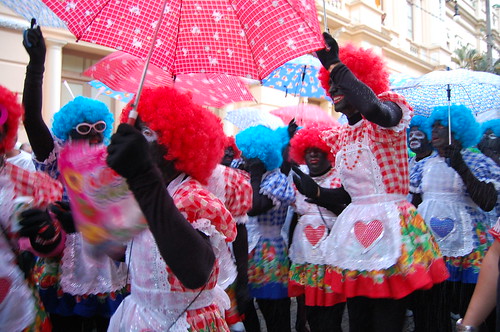
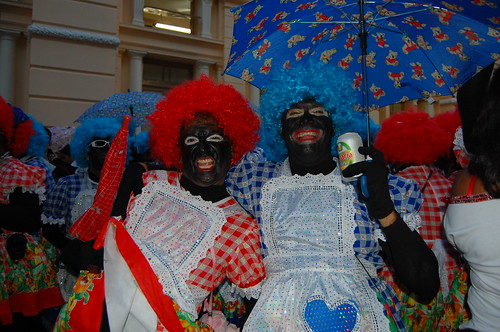
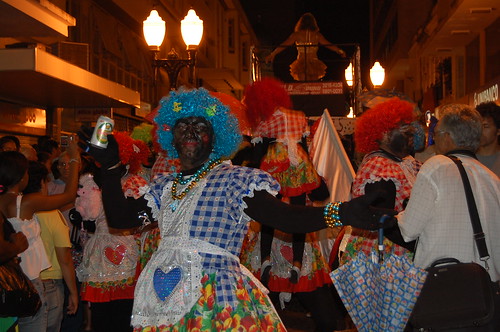
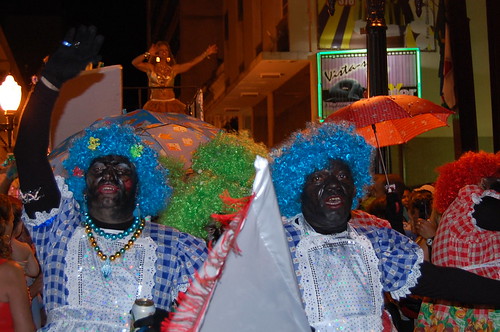
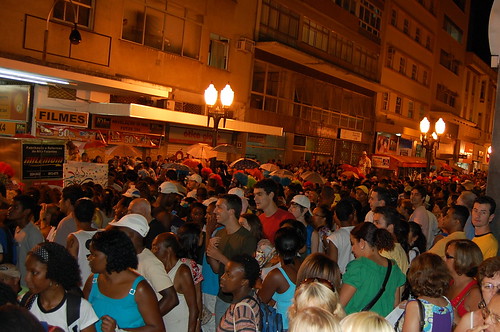
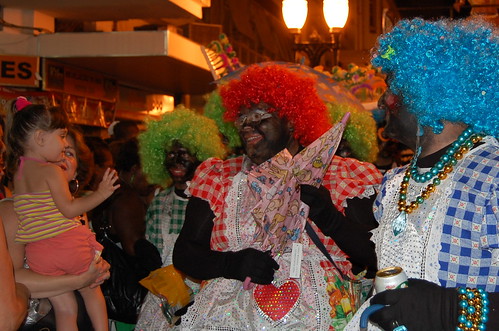
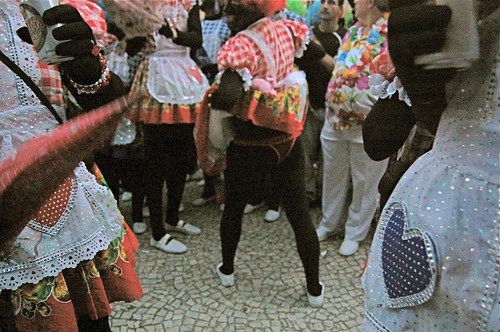







3 comments:
Hmmm, that is odd...and interesting...
Race in Brazil is a very difficult subject. When asked in open-question form on the PNAD (a national household survey done in non-Census years) a few years back, there were over 200 descriptions of skin color (which is what most people consider race). I have done focus groups where a man says he is black and his wife calls him moreno. There is an increasing black consciousness (especially among the younger, better educated Afro-Brazilians) and now the introduction of affirmative action in the universities, but most people still do not disassociate racial discrimination from economic discrimination, although more studies are showing distinct racial discrimination (controlling for race).
It is very hard for those of us from the US to understand the race issue in Brazil. My husband will continually use words like "criolo" without giving it a second thought, even though some of his closest friends, who he holds in high esteem, are black. It makes me want some of that mushroom too.
a worthy debate. but i've found discussing race in brazil is very dangerous ground. there's never been a civil rights movement here and there are certain concepts that people just don't understand. i also think that the joking and comedy related to race is a cover up for deeper, sore issues.
Post a Comment